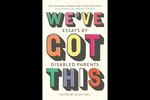
Cover, "We've Got This: Essays By Disabled Parents"
Scribe US / OPB
On this episode of, “Literary Arts: The Archive Project,” we share a conversation about something you probably never think about, unless you think about it all of the time: disabled parenting. We’ll hear from Eliza Hull, a contemporary musician, disability advocate, and writer based in regional Victoria, Australia, and the editor of a new anthology, “We’ve Got This: Essays By Disabled Parents,” which features stories from parents who identify as Deaf, disabled, neurodiverse, or chronically ill. Eliza is joined by one of the anthology contributors, Rebekah Taussig, a writer, educator, and consultant with a PhD in nonfiction and disability studies based in Kansas City. Rebekah shares her story on her Instagram and in her book, “Sitting Pretty: The View From My Ordinary Resilient Disabled Body.”
We were so interested in this conversation for many of the same reasons that Eliza put this anthology together: There seem to be a decent number of resources for the parents of disabled children, but really none for disabled parents. And it seems because a lot of people don’t even conceive of the possibility of a disabled parent, but disabled people ARE parents and have as much right to parent as anyone else – and they are good at it.
Eliza and Rebekah are joined by moderator Annie Carl, who owns and runs The Neverending Bookshop in Edmonds, Washington.
Bio:
Eliza Hull is a musical artist, writer, journalist, and disability advocate based in Victoria, Australia. Her podcast series on parenting with a disability, “We’ve Got This,” was one of Radio National’s and ABC Life’s most successful series of all time.
Rebecca Taussig, PH.D. is a Kansas City writer and teacher with her doctorate in Creative Nonfiction and Disability Studies. She has led workshops and presentations at the University of Michigan, University of Kansas, and Davidson College on disability representation, identity, and community. She also runs the Instagram platform @sitting_pretty where she crafts “mini-memoirs” to contribute nuance to the collective narratives being told about disability in our culture. She lives with two cranky orange cats and one angsty-tender human.